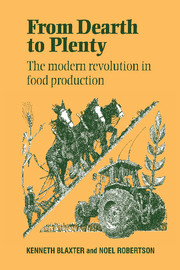Book contents
- Frontmatter
- Contents
- Preface
- Acknowledgements
- PART ONE The social, economic and political context of agricultural change
- PART TWO The science and technology of the modern agricultural revolution
- PART THREE How did the science-based revolution happen, and what is the way forward as support is withdrawn?
- 13 Science during the revolution
- Glossary
- Index
13 - Science during the revolution
Published online by Cambridge University Press: 04 August 2010
- Frontmatter
- Contents
- Preface
- Acknowledgements
- PART ONE The social, economic and political context of agricultural change
- PART TWO The science and technology of the modern agricultural revolution
- PART THREE How did the science-based revolution happen, and what is the way forward as support is withdrawn?
- 13 Science during the revolution
- Glossary
- Index
Summary
Despite the fact that agriculture is closely woven into our history, lives and consciousness, and is held in warm affection by many, it is just another industry subject to the same economic laws as the pin-making factory of Adam Smith's imagination. The extra dimensions in the agricultural industry are: its exposure to the fluctuating competition of the world market place; the acute and unpredictable impact of the variations in the weather; and its perishable products, which can be stored only with difficulty and at considerable cost. Over the 50 years from 1936 to 1986, there has been an attempt to mitigate these impediments through the provision by successive British governments of a research service and cost-free advice and support as well as the substantial price and market support provided during most of that period (Chapters 1 and 2).
Government support for science
Interest in this chapter is focused on the scientific support for agriculture. As already related (Chapter 2) the earliest allocation of funds for agricultural education was the ‘whisky money’ of 1896, which, thanks to the efforts of Mr H.D. Acland M.P., was made available to county councils for rate relief and technical education. For many U.K. counties, technical education meant agricultural education; many agricultural colleges were begun or extended at this time. Their interest for us is that the lecturing staff began to be used as advisers and often carried out simple field experimentation to solve problems of manuring, varietal value, etc.
- Type
- Chapter
- Information
- From Dearth to PlentyThe Modern Revolution in Food Production, pp. 253 - 275Publisher: Cambridge University PressPrint publication year: 1995

